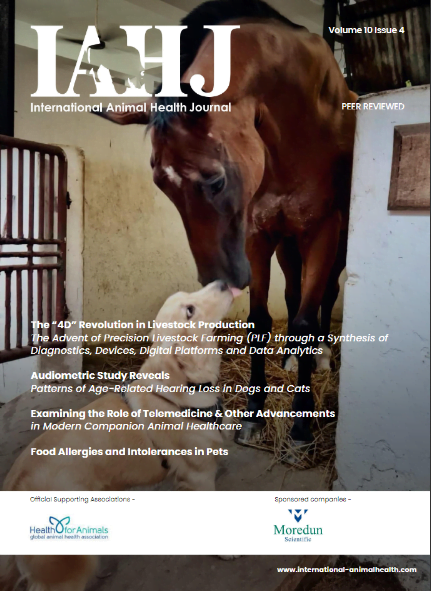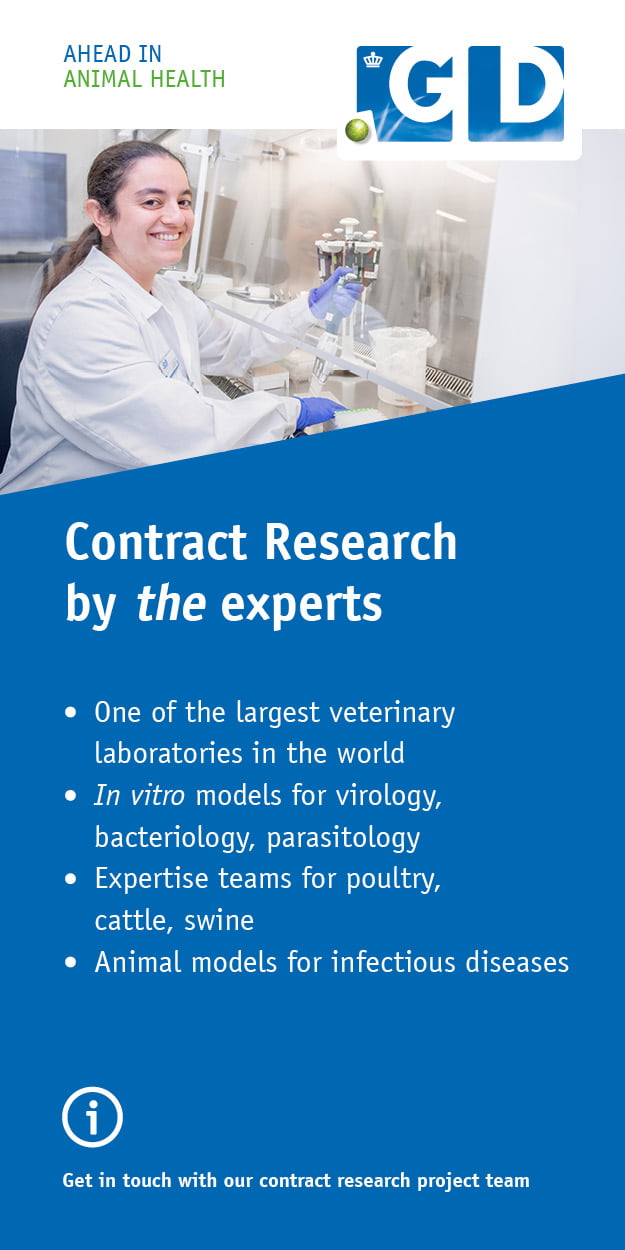
The Veterinary Public Health (VPH) Center at Boehringer Ingelheim envisions to be the preferred partner for governments and private partners, enabling them to prevent and control regulated animal diseases that have a global public health and social impact.
Epizootic diseases in animals (epidemic outbreaks of infectious animal diseases) remain a substantial challenge for the global livestock industry. With an estimated worldwide economic impact of $120 billion (~€103.8 bn) between 1995 and 2008, they are not only devastating for the economy, but they also compromise the safety and security of the world’s food supply. In addition, some diseases, such as rabies, have a direct impact on human health.
Outbreaks of foot and mouth disease (FMD) or classical swine fever (CSF) pose severe challenges to governments and the veterinary authorities, with respect to their direct and indirect impact. While the direct effects include loss in productivity, culling of animals and restrictions in the (national) movement of animals, the indirect effects, such as restrictions on international trade, can be very impactful and costly. In addition, the public acceptance of culling is rapidly decreasing in large part as a result of the distribution of vivid images of containment activities through media.
In contrast to many countries in Europe and North America, where many of the diseases have basically been eradicated and where the “stamping out” of diseases is the preferred response, there are numerous regions in which these diseases are still endemic and – at least for the time being – prevention of disease through vaccination of animals is the most effective measure.
While the decision of the appropriate response is the responsibility of the respective veterinary authorities, the animal health industry is tasked to provide effective prevention and emergency measures in the form of vaccines.
Boehringer Ingelheim’s commitment to veterinary public health
Boehringer Ingelheim’s Animal Health business is committed to fighting and preventing infectious animal diseases which pose a significant threat to humans, animals and agricultural economies in both developed and developing countries. Due to the specific nature of animal diseases and the need to embed their prevention in national response strategies, the notifiable diseases are managed by a dedicated unit, the Veterinary Public Health (VPH) Center.
The VPH Center partners with health authorities, governments and NGOs, and holds the industry’s largest portfolio of vaccines against government-regulated diseases. Due to the VPH Center’s longstanding experience with epizootic diseases, it has been able to accumulate unique experience in selecting, developing and manufacturing high-quality vaccines with superior protection.
The VPH Center’s vision
The substantial impact of epizootic diseases on animals and humans is the “raison d’être” of Boehringer Ingelheim’s VPH Center, whose vision is “to be the preferred partner of governments and private customers, enabling them to prevent and control regulated animal diseases that have a global public health and social impact”.
A continuous threat requiring ongoing vigilance
Modern trends of climate change and globalisation — with more and more cross-border movement of humans, livestock, and food products — have dramatically intensified, including:
- An increase in the number of emerging and re-emerging animal diseases;
- Their spread throughout the world; and
- The risks associated with outbreaks.
In addition, due to the speed of these movements, the predictability of disease outbreaks has further decreased. While governmental prevention and containment measures have made good progress in many countries, in large parts of the world the necessary surveillance and control measures are not yet sufficient to ensure good control in the absence of vaccination.
It is estimated that up to 20% of global animal production is lost to disease. FMD alone – the first disease for which the World Organization for Animal Health (OIE) established an official list of disease-free countries and zones – has caused huge losses in the last decades, amongst which:
- More than five million cattle and sheep were euthanized in the UK in 2001, with an impact of $10 billion; and
- Over three million animals were culled in South Korea in 2010, with an economic burden of nearly $8 billion.
Unique positioning within the industry
Based on the quality of our vaccines, the technical support provided by our veterinarians, our biological expertise and our responsiveness to urgent issues, Boehringer Ingelheim’s Veterinary Public Health business is recognised as a market leader by governments, veterinarians and producers across the world, as well as NGOs such as the OIE and the UN’s Food and Agriculture Organization (FAO). Respecting an agile way of working, it also adapts different business models according to local epidemiology: right solutions, right place, right time.
A diversified offer to meet specific needs
Indeed, finding the right solution quickly requires seamless co-operation between all functions, quick decision making to allocate the right supply at the right lead time, as well as dedicated, best-in-class specialists in disease prevention and control. To this end, the VPH Center has designed a three-option model, tailored to local situations:
Antigen banks in disease-free regions
In disease-free countries, the main focus is on preparedness and speed of response. In the case of FMD or bluetongue virus (BTV), the origin of outbreaks is typically from outside of the region, so it is often unclear which vaccine strains are going to be needed for optimal immunity, hence protection. Boehringer Ingelheim’s response to this situation is to partner with public health authorities upstream in order to set up appropriate strategic reserves of antigens which are stored in secure facilities.
In the event of an outbreak, all production of vaccines, other than FMD, is stopped and an emergency procedure is put into place to formulate purified antigens into finished vaccines within a few days, providing quasi immediate access to vaccines for the relevant authority; BI Animal Health operates 19 antigen and vaccine banks throughout the world.
Last year, the French BTV bank – the first and only BTV antigen bank in the world – was triggered in response to the threat of a BTV outbreak in southeastern France. 1.7 million doses were formulated in only 11 days. In addition, the ability to quickly adapt new emerging strains to production conditions, and to scale-up to commercial manufacturing volumes, requires substantial experience that has been acquired over many decades by the VPH Center team.
Emergency product shipment
In the case of disease outbreak, and generally in response to government tenders, Boehringer Ingelheim ships vaccines in order to stop the epidemic quickly. This model relies upon VPH’s epidemiological surveillance and anticipation, as well as the reactivity of our production teams and the strong involvement of local distributors and agents. For example, in 2015, 2.4 million doses of the BTV vaccine were delivered over a two-month period to Bulgaria in order to contain the emerging epidemic. This was possible largely because of the understanding of which strains would likely be relevant and with thanks to a network of global contacts with diagnostic laboratories.
Bulk vaccine supply through local partnerships in endemic regions
In countries facing endemic situations and with an ongoing need for large volumes of vaccines, three types of local agreements have been contracted by VPH teams:
- Supply of bulk vaccine for local filling. That means that the VPH team produces the relevant formulated vaccine and then ships it to partners who then fill, label and distribute the vaccine in case of an emergency. In this situation, the partners can optimally leverage the expertise and economies of scale provided by the VPH Center with the agility and proximity to the potential emergency afforded by the local partner.
- Supply of concentrated antigens and raw materials for local formulation and filling. In this case, concentrated, frozen (production) biomass is shipped and the partner additionally provides the formulation of the vaccine when needed. The advantage is longer storage of the antigen.
- Full technology co-operation and transfer. This form of collaboration includes full transfer of know-how and production capabilities to a local partner. This model requires the closest collaboration, whilst the transfer of technology is time and resource consuming.
Our vaccines against the five major OIE-listed animal diseases
FMD
A highly contagious viral infection of cattle, pigs, sheep, goats, buffalo, and other ruminants, FMD is characterised by fever and blister-like sores on the tongue and lips, in the mouth, on the teats and between the hooves, leading to suffering and decreased food intake, followed by significantly reduced productivity of the animals. In rare cases, FMD can be lethal. The EU and North America are considered FMD free, but it is still endemic in several parts of Asia, most of Africa and the Middle East. Several different forms – serotypes – of FMD exist and vaccines against a certain serotype provide insufficient protection against other serotypes. Boehringer Ingelheim is the world’s leading producer of FMD vaccines.
BTV
A vector-borne viral disease in sheep, cattle and other ruminants, BTV, due to its transmission via flying insects, can spread quickly over very large areas and even across sizeable bodies of water. BTV causes many different symptoms in affected animals, including:
- Fever;
- Edema;
- Nasal discharge;
- Sores; and
- Reproductive problems.
The bluetongue virus is present in Africa, Asia, Australia, Europe and North America and, similar to FMD, multiple serotypes with limited cross protection exist. The disease has been
re-emerging with increased frequency since 2006. Boehringer Ingelheim is the pioneer producer of inactivated vaccines against BTV.
Rabies
A fatal infection of the central nervous system of warm-blooded animals and humans, rabies causes the death of 60,000 people a year, the majority of which are children. In up to 99% of cases, dogs are responsible for rabies virus transmission to humans. Boehringer Ingelheim is the world’s leading producer of rabies vaccines for animals and is actively involved in many animal vaccination programs to eradicate this disease in both animals and humans.
Peste des petits ruminants (PPR)
PPR, also known as ‘goat plague’, is a contagious viral disease of goats and sheep characterised by:
- Fever;
- Sores in the mouth;
- Diarrhoea;
- Pneumonia; and
- Death.
The disease has been spreading worldwide significantly in the last 12 years. A global eradication program was launched by OIE and FAO in 2015 – it is planned to last 15 years and is based on massive vaccination schemes in Africa, the Middle East and Asia. Boehringer Ingelheim’s Animal Health business unit, through the Botswana Vaccine Institute, will be highly involved in the eradication.
Lumpy skin disease (LSD)
A blood-feeding, insect-transmitted viral disease that affects cattle, LSD causes fever and nodules on the skin and can lead to death, causing significant economic losses. The disease is present in many African countries. Since 2012, it has been spreading from the Middle East to South-East Europe, affecting Greece and Bulgaria, as well as several other countries in the Balkans. The Veterinary Public Health Center participates in research programs against LSD.1
Continuing the work of Boehringer Ingelheim
Managing regulated animal diseases requires a fully holistic approach since epizootics can impact human lives through both health and trade. Global warming, geo-political tensions and trade considerations are all accelerating factors. Veterinarian professionals strive to constantly focus on preparedness to combat outbreaks anywhere in the world, juggling between the constraints of crisis management and in-the-field emergency disease control.
In that battle, the Veterinary Public Health Center at Boehringer Ingelheim envisions to be the preferred partner for governments and private partners, enabling them to prevent and control regulated animal diseases that have a global public health and social impact. We believe that our experience in making effective vaccines, our global network in surveillance and monitoring and our know-how in disease management make us preferred partners in the quest for healthy animals and healthy food. We believe that prevention works.












